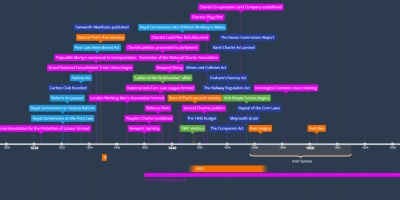1 март 1839 г. - National Anti-Corn Law League formed
Описание:
Corn Laws had become a symbol of the old order's protection of agriculture at the expense of industry and commerce.Pressure group was established to bring about their repeal, but this in turn encouraged those in Peel's party who were unhappy at the pace of change and felt that he was moving too far to meet the needs of urban and industrial groups at the expense of landowners, to resist repeal.
The group was led by radical business men (Richard Cobden and John Bright) and formed to bring together the different groups protesting about the Corn Laws. The League raised money from its middle-class supporters to send out lecturers and speakers to maintain a constant pressure for repeal. Was organised enough to campaign to get sympathetic MPs elected - devoted itself to ensuring its supporters were registered to vote well before an election and used its funds to finance campaigns. League supporters bought property in the counties to qualify for the vote. Its public meetings attracted large audiences and substantial support from nonconformists. Little attempt to unite League pressure with working-class and Chartist agitation. Also used lectures, bazaars, rallies, banners, posters, ladies' groups, journals and newspapers.
Argued that:
- Corn Laws went against the ideals of free trade
- workers needed cheaper bread to improve living standards
- the high cost of bread made the cost of manufactures high, which resulted in depressions and so harmed manufacturers, workers and the cities of the north
- stopping foreign countries selling Britain wheat meant that these countries didn't have the money or incentive to buy British goods
- the Corn Laws benefited only the landlords and aristocrats and were a symbol of their power, but Britain had moved on and the Laws should reflect not the old landed classes' interests but those of the new middle classes
extent of success:
- made no effective appeal to the politically powerful landed interst
-the working class remained suspicious suspicious of a middle-class pressure group (Cobden was reluctant to link middle-class and working-class pressure)
- its opponents continued to associate the Corn Law repeal with a low-wage economy offering little to the working man
- 'Anti-League' was one of a number of effective anti-repeal groups, able to pick holes in the League's case
- inadequate in attempts to win parliamentary seats purely on a repeal 'ticket'
- thanks to Peel's enthusiasm for free trade in general, his increasing dislike of the existing Corn Laws in particular, the Anti-Corn LAw Oeague was swimming with an increasingly strong tide
Добавлено на ленту времени:
Дата:
1 март 1839 г.
Сейчас
~ 186 г назад
